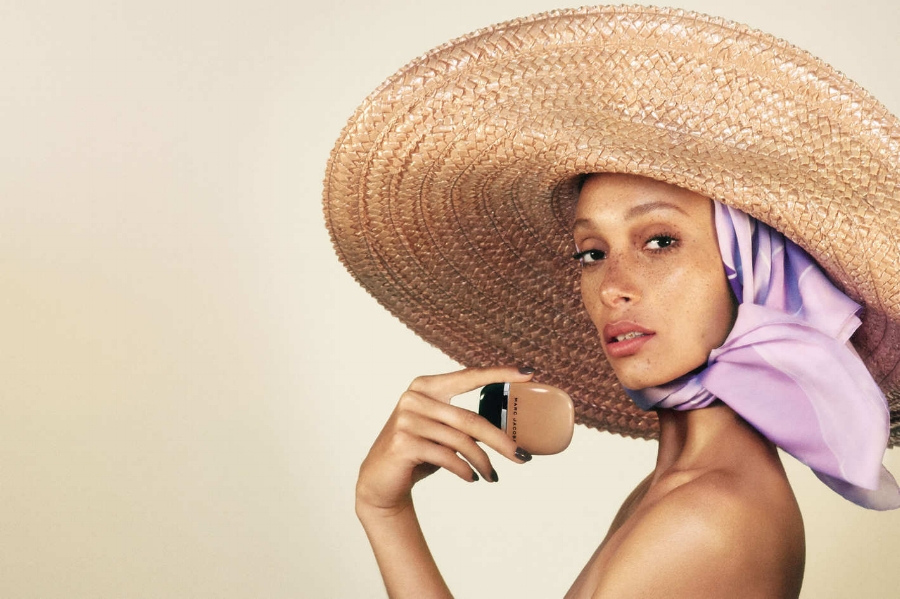
image: Marc Jacobs
Adwoa Aboah landed one of the most anticipated magazine covers of 2017. Photographed by Steven Meisel, wearing Marc Jacobs, Aboah was the first face of what has been deemed the “new Vogue,” or British Vogue under the watch of new editor-in-chief Edward Enninful. “Being on this cover is the biggest thing that’s happened in my career,” said Aboah, who was recently honored with the “Model of the Year” title at the 2017 Models.com Awards, after landing on nearly all of the year’s biggest runways and appearing in ad campaigns for brands ranging from Miu Miu, Dior, and Marc Jacobs to H&M, Gap, and Sephora.
But before Ms. Aboah landed on British Vogue’s big cover, she found (and continues to find) herself front and center in another matter, a decidedly more contentious one: The $1 million-plus legal battle between New York-based model management companies, The Lions and DNA.
Yes, the London-based beauty – who as Glamour aptly put it, is “one of the most exciting models in the industry thanks to her striking looks and enviably cool attitude” – is at the crux of a particularly ugly lawsuit between the rival model management companies after DNA allegedly poached the top model knowing full well that she had an exclusive contract with The Lions.
In its suit, which was filed in September, The Lions alleges that it entered into a contract with Aboah in 2015 – when she was still a virtually unknown model, making just $25,000 annually – to represent her exclusively in the U.S. for a duration of three years. That contract was slated to remain in effect in January 2018, meaning that for the duration of the term, Aboad would be booked for jobs in the U.S. by The Lions and owe a percentage of her earning for each job (usually 20 percent or so) in connection with its representation/promotion of the model.
Everything was going well – per The Lions – until Aboah reached her top earning power in 2017 and began making millions. At this point, the 25-year old, who is not named as a defendant in the lawsuit, jumped ship to rival management company DNA Models months early, where, according to The Lions, her mother Camilla Lowther had negotiated a reduced commission fee, thereby enabling Aboah to make more money for each job.
Things got particularly ugly, The Lions says, after Aboah threatened that her mother – who owns/runs CLM Agency, which represents a huge slew of fashion figures, including photographer Juergen Teller, and stylists Katie Grand and Venetia Scott – would “cause The Lions problems in the fashion industry unless The Lions agreed to release Aboah from her contractual obligations.”
Additionally, The Lions claims that DNA’s owner, David Bonnouvrier, a close friend of Lowther’s, made the same threats – i.e., that Lowther would harm The Lions’ business – if it tried to block Aboah from switching to his agency.
Such allegations promoted The Lions to file suit, accusing Lowther, and Bonnouvrier and DNA of “intentionally and improperly” interfering with its contract with Aboah.
Lowther and Bonnouvrier have since taken to fighting The Lions’ allegations and have asked for the court to toss out what they claim is a baseless case. Lowther, for one, has alleged that her daughter did not breach her contract, as she held the right to end her representation and switch agencies, making The Lion’s lawsuit without merit.
Bonnouvrier and DNA have echoed this, stating in court documents that “Aboah held the right to terminate her contract, and that they are likewise ‘entitled to compete fairly with rival management companies.’ The agency added that models are ‘not indentured servants and are free to move from one management firm to another,’” per WWD. (This questionable line of reasoning, of course, seems to overlook the inherent purpose of a entering into a contract in the first place and the notion of a contract breach).
Things got even uglier last month when The Lions alleged that Lowther and Bonnouvrier had quietly procured a U.S. work visa for Aboah through DNA (up until that point, Aboah held a visa through The Lions, thereby limiting her to “working exclusively through the Lions”). The DNA-filed visa was granted at the start of September, at which point The Lions claims that Lowther and Bonnouvrier specifically directed the Aboah to breach her contract with The Lions and deflect to DNA.
The lawsuit at hand is hardly the first of its kind. In fact, it is the latest in a line of similar lawsuits that allege poaching of models, something of a common practice, particularly when agents jump from one agency to another and then attempt to bring their top models with them, which is not actually the case at hand.
It is also a common occurrence when agencies are attempting to boost their rosters of models, which according to The Lions is exactly what is going on here, as it alleges that right around the time that DNA started negotiating with Aboah, it “had been suffering with model defections and needed a renowned model to help its business.”
More to come …











